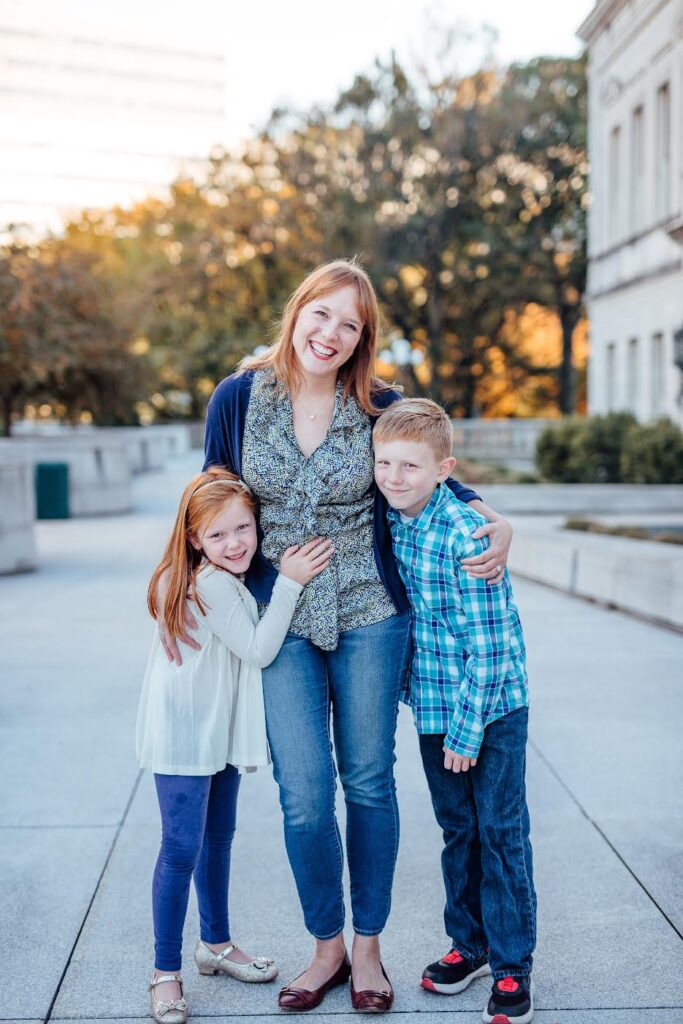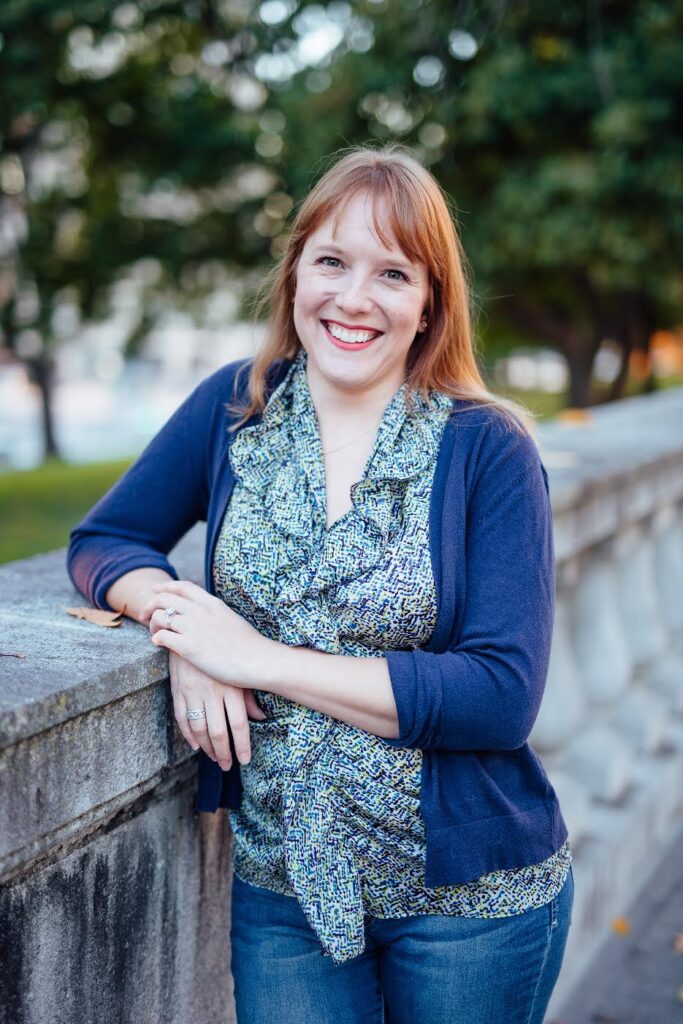
A few weeks ago I sat down over zoom with Dani Gross—a member of Ed Voters’ advisory committee, public education advocate, and parent who lives in the West Shore School District—to learn more about her advocacy strategies, how she works with her school board, and her tips for using Twitter.
- Tell us about your school district and school community.
The West Shore School District straddles two counties: Northern York county and Western Cumberland county. There are around 7,500 students and like many Pennsylvania school districts, students fall across the economic spectrum. It is predominately white with some students of color. The area has been known as one of the more rural Harrisburg suburbs but is now transforming due to more expansion and developments. We have the lowest local tax burden in York county and are in the middle compared to other school districts in Cumberland county. Also, we are in the bottom quarter of student expenditures in the state. My kids are in first and third grade and attend the oldest elementary school in the district. It was supposed to be rebuilt by now, but due to the pandemic, it was pushed back to the spring. There is currently no air-conditioning in the school and teachers can’t even use portable fans or air-conditioning units because it could cause the breakers to trip. We need schools that can physically support a 21st-century education.
- What would you say are the strengths of your school district/community? What makes you proud to be a community member?
The community here is very close-knit and supportive. Many people, including my husband’s family, have been in the area for decades. Generally, there is a lot of support in people helping their neighbors and wanting the best for students even if there can be some disagreement on how to accomplish that. Our administrators and school principals and school/support staff are all amazing and have been very dedicated to the students and making the community a better place. A few years ago there was a terrible heat wave for several days. Several community members of a Facebook page coordinated buying popsicles for our schools—starting with schools without air-conditioning and then expanding to all the schools in the district. Some people drove 30 minutes away just to get popsicles to donate and even thought of sugar-free popsicles for students with diabetes. It really showed that there is a lot of community support here.
- How did you get involved in school board meetings? What motivated you?
I have a lot of experience attending public meetings and doing advocacy work as a communications director at Shelly Lyons Public Affairs and Communications. Then when my kids started going to school I really started paying attention more specifically to school board meetings that were streamed online during the pandemic.
As we started to prepare to return in the 2021 school year, I started seeing signs and posts about “un-mask our children”. In the meantime, I had joined some safe return to school Facebook groups and I had seen a petition that had circulated in other districts. Feeling inspired, I copied elements of the petition to better fit my community and created a survey that was pro-mitigation. I got 100 people to sign in the first 24 hours and it started rapidly circulating. I was very nervous about posting in my local Facebook group and when the “trolls” started to respond I used a lot of humor and patience. I tried to reiterate that I am also a community member and deserve to be heard. The list culminated in around 300 people and I was intentional that it was for anyone who lived in the district-not just parents/guardians. Then, I started emailing the list of things they could do if they had one, five, ten minutes like sharing the petition with friends or contacting their school board. To date, most of our school board meetings have had a 2:1 with pro-mask and pro-mitigation comments except for one where comments were tied. In this way, I think we are continuing to make a difference and push the needle.
- This year has been challenging with debates across the country around COVID-19 and Critical Race Theory (CRT), what are your thoughts on this? How is your school board responding?
In the school board election, we lost one pro-mask seat so we are at four-five now. Two of the new members are anti-mask and completely against CRT. In our meeting before Thanksgiving, the superintendent proposed a plan that the board adopted to keep masks in our schools for students in 6th-12th grade through December 22nd and elementary students through January 2022. After that masks are considered optional. Masks are also not required for after-school activities, sports, etc. Students will only be required to quarantine if they have symptoms-meaning asymptomatic students are not required to quarantine. I think if you are going to be changing when masks are/are not required there needs to be a system in place to inform everyone so they created a district masking threshold. The masking threshold depends on the student population and the number of cases that occur in a 14 day period. If that metric is met, they must start wearing masks for 10 calendar days at a time. At the last school board meeting, I said I understand that some people send their kids to school with symptoms because they don’t have access to childcare yet there are other people who just don’t seem to care.
- Are there strategies you have used where you feel like your school board was more or less receptive?

We have been starting to really see push-back in the community against the anti-maskers and school board members who have been yelling and screaming when they disagree. People in the community are done seeing this behavior and treatment of others. At the last meeting, there were no people in the anti-mask group and it was a very calm, subdued meeting. There is a spectrum of folks who are interested in covid-mitigation and caution. I think it can be useful to make the biggest ask but also be willing to accept compromise and our board members and administrators have been receptive to it. I also think it is helpful to talk about your own experience and children’s experience rather than just research. For example, a lot of people on my list talk about their loved ones who are immuno-compromised or that we need to be cautious until all children are vaccinated. A lot of people are tired of the conflict and drama and are more receptive when you can come to a compromise.
- As a parent/advocate do you have any advice for other parents/advocates? What are some easy ways to get involved?
Don’t be afraid to speak out because there are a lot more people who agree with you than you think! Start with people you know and try mobilizing your cell phone contacts; friends, parents, community members. Also, don’t hesitate to speak out at school board meetings. There are a lot of useful skills you might have that you don’t even realize like if you are a scout leader or a room parent. If you are mobilizing people try not to always be doom and gloom. I emailed my list asking them to email the school nurse and tell them you appreciate them because I know they have been struggling this year. Of course, not everyone will email, but a few people uplifting the school nurse is still a win!
- I’ve noticed you are very active on Twitter…do you have any tips?
My top Twitter tip is don’t amplify the conspiracy theories or the falsehoods instead, try to be authentic and make it fit your voice. There are a lot of great people in the Pennsylvania Twitter world to connect and interact with. I would keep it true to yourself and your community’s needs.
- What are ways that you stay informed on what is happening in your school community/district?

I try to keep up with the PTO and school district Facebook page to see what’s on the radar. I also try to keep an open communication line with my children’s teachers who are severely overwhelmed this year. I’m in a unique position because I am online with work and trained to keep an eye out for issues and trends. I would say listening to school staff, talking to other parents, and not making assumptions are all vital.
- What are your thoughts on the fair funding lawsuit in PA—how do you think it could benefit your district?
I’m really hopeful that the school funding lawsuit will be successful in requiring that the state provide an adequate amount of funding for our public schools. A lot of people don’t realize that the shortcomings of funding from the state mean that local taxpayers foot the bill. Oftentimes when you are mad about your property taxes you shouldn’t be mad at your school board because they’ve been scrimping and strategizing and trying to make the budget work. There are a lot of instances of systematic, chronic underfunding of important systems that help people throughout Pennsylvania. According to the fair funding formula, in West Shore, we would see 22 million more in state funding annually which is certainly not chump change.
- If you could create a perfect school system/school board what would it look like?
An ideal school district and school board would have all of our student’s’ needs and interests at the forefront of everything they do. They would also have all of the funding to meet those needs instead of being forced to use funds based on “who deserves this more”. Also, the school board wouldn’t have to be made up of any specific political composition- it just would need members whose agenda is providing an excellent public education for their students. Ultimately, they would have to be willing to listen to constituents, compromise, and think outside the box.

- Is there anything you would like to shout out?
Folks affiliated with Education Voters may already know this group, but my firm works closely with the PA Schools Work Campaign—a diverse group of people and organizations across Pennsylvania who are interested in improving public education. I think it’s a great organization and advocacy cause to get behind.
